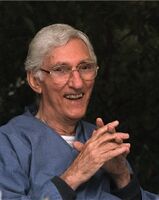Sangharakshita: Difference between revisions
(Created page with "{{Person |HasDrlPage=Yes |HasLibPage=Yes |pagename=Sangharakshita |MainNamePhon=Sangharakshita |SortName=Sangharakshita |namefirst=Dennis |namemiddle=Philip Edward |namelast=L...") |
No edit summary |
||
| Line 2: | Line 2: | ||
|HasDrlPage=Yes | |HasDrlPage=Yes | ||
|HasLibPage=Yes | |HasLibPage=Yes | ||
|MainNamePhon=Sangharakshita | |MainNamePhon=Sangharakshita | ||
|SortName=Sangharakshita | |SortName=Sangharakshita | ||
| Line 12: | Line 11: | ||
He was one of a handful of westerners to be ordained as Theravadin Bhikkhus in the period following World War II, and spent over 20 years in Asia, where he had a number of Tibetan Buddhist teachers. In India, he was active in the conversion movement of Dalits—so-called "Untouchables"—initiated in 1956 by B. R. Ambedkar. He wrote more than 60 books, including compilations of his talks, and was described as "one of the most prolific and influential Buddhists of our era," "a skilled innovator in his efforts to translate Buddhism to the West," and as "the founding father of Western Buddhism" for his role in setting up what is now the Triratna Buddhist Community, but Sangharakshita was often regarded as a controversial teacher. ([https://en.wikipedia.org/wiki/Sangharakshita Source Accessed Mar 8, 2021]) | He was one of a handful of westerners to be ordained as Theravadin Bhikkhus in the period following World War II, and spent over 20 years in Asia, where he had a number of Tibetan Buddhist teachers. In India, he was active in the conversion movement of Dalits—so-called "Untouchables"—initiated in 1956 by B. R. Ambedkar. He wrote more than 60 books, including compilations of his talks, and was described as "one of the most prolific and influential Buddhists of our era," "a skilled innovator in his efforts to translate Buddhism to the West," and as "the founding father of Western Buddhism" for his role in setting up what is now the Triratna Buddhist Community, but Sangharakshita was often regarded as a controversial teacher. ([https://en.wikipedia.org/wiki/Sangharakshita Source Accessed Mar 8, 2021]) | ||
|PersonType=Authors of English Works; Western Buddhist Teachers | |PersonType=Authors of English Works; Western Buddhist Teachers | ||
|images=File:Sangharakshita2002 wikipedia.jpg | |||
|BuNayDefProvComplex=No | |BuNayDefProvComplex=No | ||
|BuNayWheelTurnComplex=No | |BuNayWheelTurnComplex=No | ||
| Line 20: | Line 20: | ||
|BuNayEmptyLuminComplex=No | |BuNayEmptyLuminComplex=No | ||
|IsInGyatsa=No | |IsInGyatsa=No | ||
|pagename=Sangharakshita | |||
}} | }} | ||
Revision as of 19:42, 8 March 2021
| PersonType | Category:Authors of English Works Category:Western Buddhist Teachers |
|---|---|
| FirstName / namefirst | Dennis |
| LastName / namelast | Lingwood |
| namemiddle | Philip Edward |
| MainNamePhon | Sangharakshita |
| SortName | Sangharakshita |
| bio | Sangharakshita (born Dennis Philip Edward Lingwood, 26 August 1925 – 30 October 2018) was a British Buddhist teacher and writer. He was the founder of the Triratna Buddhist Community, which was known until 2010 as the Friends of the Western Buddhist Order, or FWBO.
He was one of a handful of westerners to be ordained as Theravadin Bhikkhus in the period following World War II, and spent over 20 years in Asia, where he had a number of Tibetan Buddhist teachers. In India, he was active in the conversion movement of Dalits—so-called "Untouchables"—initiated in 1956 by B. R. Ambedkar. He wrote more than 60 books, including compilations of his talks, and was described as "one of the most prolific and influential Buddhists of our era," "a skilled innovator in his efforts to translate Buddhism to the West," and as "the founding father of Western Buddhism" for his role in setting up what is now the Triratna Buddhist Community, but Sangharakshita was often regarded as a controversial teacher. (Source Accessed Mar 8, 2021) |
| IsInGyatsa | No |
| Other wikis |
If the page does not yet exist on the remote wiki, you can paste the tag |

